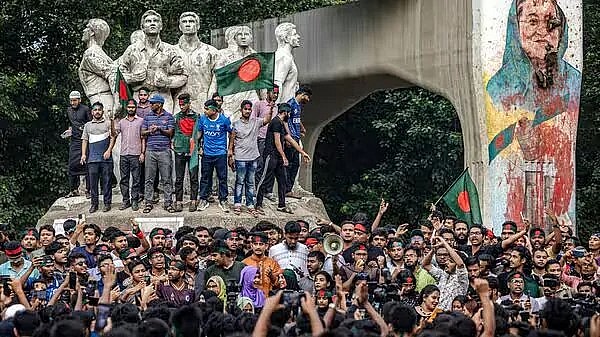 |
A recent analysis by the Geopolitical Economy Report reveals concerning insights into the United States’ alleged involvement in the recent regime change in Bangladesh, highlighting potential implications for regional stability and sovereignty.
At the core of this issue is the United States’ strategic interest in establishing a military base on St. Martin’s Island, located in the Bay of Bengal. This location provides a strategic foothold for projecting American power into the region, particularly towards the Bay of Bengal and neighboring Myanmar. The establishment of such a base would significantly increase the US military presence in South Asia and play a critical role in its Indo-Pacific strategy. However, it also represents a shift in regional power dynamics, potentially disrupting the fragile balance of power in the region.
Adding to this complex situation are allegations of US support for a color revolution in Bangladesh. There are suggestions that the US has funneled funds through organizations like the National Endowment for Democracy to strengthen opposition groups, drawing parallels to similar movements in Eastern Europe and Central Asia. This backing has empowered domestic factions to challenge the established government, creating an environment prone to political instability. The historical alignment between the US and right-wing opposition groups, particularly the Bangladesh Nationalist Party (BNP), indicates a pattern of external interference targeting democratically elected governments.
The consequences of such interference are evident in the violent protests that have gripped the country. The US endorsement of these demonstrations, amplified through media outlets, has fueled unrest. Calls for “free and fair” elections, often coming after opposition boycotts of previous electoral processes, further undermine the legitimacy of the political system and erode public trust. This orchestrated chaos not only weakens the government but also creates a power vacuum that could lead to prolonged instability.
Historical precedents support these allegations. The US has a track record of supporting coups against leaders who oppose their geopolitical interests, such as Saddam Hussein in Iraq, Manuel Noriega in Panama, and Imran Khan in Pakistan. These interventions, driven by strategic goals, often result in long-term regional instability and contradict the US’s professed support for democracy and self-determination.
The potential establishment of a US military base in Bangladesh is not an isolated event but part of a broader strategy to assert influence over vital maritime routes and counterbalance rising regional powers. Coupled with support for opposition groups, it indicates a deliberate attempt to reshape Bangladesh’s political landscape to align with US interests. The implications of these actions go beyond short-term political turmoil, posing significant threats to Bangladesh’s national sovereignty and regional harmony.
As Bangladesh navigates the aftermath of Sheikh Hasina’s removal from power, both domestic and international stakeholders must carefully examine the forces driving this change. External interference not only challenges the integrity of the country’s democratic institutions but also sets a dangerous precedent for other nations in the region. Upholding the principles of self-determination and resisting undue external influence are crucial steps towards ensuring lasting peace and stability in South Asia.
The allegations of US involvement in Bangladesh’s regime change deserve serious attention and open discussion. As the country faces potential instability, it is essential to address these concerns transparently and assert Bangladesh’s sovereignty. Only through vigilance and a commitment to self-determination can Bangladesh forge a stable and prosperous future, free from external manipulation.
India, Bangladesh to Begin Trade Talks to Further Strengthen Ties
Indian Prime Minister Narendra Modi and his Bangladeshi counterpart Sheikh Hasina on Tuesday held an extensive discussion on a range of bilateral issues as they decided to start negotiations on a comprehensive economic partnership agreement (CEPA) to sustain momentum in the bilateral ties, according to the aninews.in








